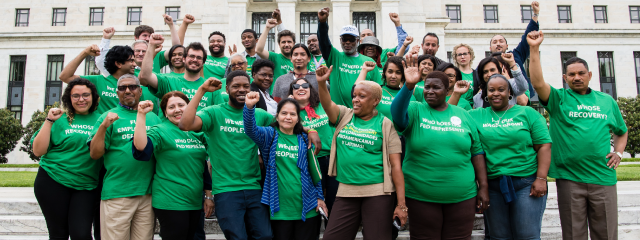Confronting Inequality at the Fed

The Fed Up coalition, organized by the Center for Democracy (CPD) and made up of over 70 community-based organizations, nonprofits, and unions advocating for a strong economy, brought the campaign to the nation’s capital earlier this month, transforming a series of Congressional hearings dominated by right-wing critiques of the Fed into a conversation about race and inequality in America.
The coalition brought 80 representatives to the House and Senate’s “Humphrey-Hawkins” hearings, where 12 House representatives and four senators publicly commended the coalition and pressed Fed Chair Janet Yellen to answer for the continued lack of economic recovery in Black and Latino communities as well as the Fed’s failure to adequately represent the public interest. (You can read our compilation of their questions and comments here.)
These 16 members of Congress were enlisted by the directed efforts of Fed Up coalition leaders, a strategy that paid off. That day the Washington Post reported on the “confrontational” nature of the queries: “Republicans have long fought to rein in the Fed’s powers, but even Democrats proved combative Wednesday, with several accusing the central bank of ignoring the plight of minority workers. ‘We have got to get the Fed to get off the dime and put the issue of African-American unemployment on the front burner,’ said Rep. David Scott (D-Ga.).”
CPD was joined by a broad array of Fed Up coalition partners, including Communities Creating Opportunity (MO), SPACEs DC (a new CPD core partner that joined the campaign this year), and CPD core partners Make the Road New York, New York Communities for Change, Action United (PA), Neighborhoods Organizing for Change (MN), RiseUp Georgia, Missourians Organizing for Reform and Empowerment, and Sunflower Community Action (KS).
Earlier in February, CPD released a report with Fed Up coalition partners outlining how the Federal Reserve’s leadership structure is skewed in favor of major corporate and financial interests. This profoundly undemocratic system delivers economic policy that privileges the concerns of the wealthy over the welfare of low-income communities, historically and disproportionately affecting people of color. The findings of the report,“To Represent the Public”: The Federal Reserve’s Continued Failure to Represent the American People, were featured in a major Wall Street Journal article and summarized in CPD’s op-ed in The Hill.
“To Represent the Public” shows that the Fed’s December decision to raise interest rates—which reduces aggregate demand, slows job creation, undercuts workers’ bargaining power, and leads to lower wages—was the result of leadership dominated by bank executives who profit from higher interest rates and corporate executives who profit from lower labor costs.












